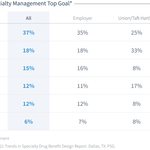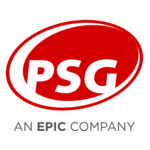
Trends in Specialty Benefit Design Report Released by Pharmaceutical Strategies Group
Results in PSG’s latest research indicate a growing interest in disrupting the status quo relative to specialty drug management
DALLAS--(BUSINESS WIRE)--Extensive research about the latest trends in specialty benefit design launches today. Pharmaceutical Strategies Group (PSG), an EPIC company, developed the Trends in Specialty Benefit Design Report. This proprietary research delivers detailed intelligence to enhance the ability of employers, labor groups, and other plan sponsors to unpack the specialty drug benefit design landscape.


Specialty drugs remain a top concern, and the appetite for disruption is growing
“As long as specialty drugs represent a significant proportion of overall drug spend, they will remain a top concern for plan sponsors,” said Michael Lonergan, President of PSG. “The dual payment methodology, where drugs fall under the medical or pharmacy benefit, and in some cases, both, adds the intricacy of specialty drug management.”
Reducing inappropriate utilization is the top plan sponsor goal for specialty drug management
“Respondents ranked their goals related to managing specialty medications in the coming year. Reducing inappropriate utilization ranked highest for all respondents, employers, and health plans (37%, 35%, and 50%, respectively),” said Renee Rayburg, RPh, Vice President, Specialty at PSG.
Plan sponsors identify a gap in tracking the effects of specialty drugs on productivity
“More than 80% of plan sponsors have access to reporting on their total healthcare costs,” said Tracy Spencer, Senior Vice President and Practice Leader of Employer Groups, Labor, and Health Systems at PSG. “However, clinical outcomes of adherence, persistency and clinical efficacy were reported less often (71% and 31%, respectively).”
“The impact of specialty medications on employee productivity had the lowest reporting rate at 23%.”
Key takeaways from the Trends in Specialty Benefit Design Report include:
-
70% of plans can track specialty drug spend separately under the medical benefit
- An increase from the 50% reported in 2019
- 43% of plans have more than one specialty cost-sharing tier
-
50% of employers are aware of new to market formulary blocks
- 20% of plans can track patient treatment delays due to new to market blocks
- Over 90% of plans use prior authorization, step therapy, and quantity limits as management strategies
- Over 50% use at least one strategy to increase the use of biosimilars
- 8% of plans are currently using alternative funding models, while 31% are exploring their use
Download the Trends in Specialty Benefit Design Report: https://www.psgconsults.com/2022specialtyresearch
About the Trends in Specialty Benefit Design Report
PSG has researched drug benefit design for over 25 years. In recognition of the cost and clinical management challenges associated with specialty drugs, this report takes an in-depth look at trends and best practices in specialty benefit design. The survey sample informing this report included 171 benefits leaders representing plan sponsors of an estimated 41.4 million covered lives. Topics include specialty management strategies, cost-sharing, specialty drug cost claims analysis, new to market formulary blocks, utilization management, strategies for biosimilars, biomarker diagnostic testing, Alzheimer’s Disease, site of service, specialty drug rebates, alternate funding models, and forward-looking plan sponsor perspectives.
About PSG
Pharmaceutical Strategies Group, an EPIC company, relentlessly advocates for clients as they navigate complex and ever-changing drug cost management challenges. PSG functions as a strategic partner through industry-leading intelligence and technologies to realize billions of dollars in drug cost savings for clients every year.
Contacts
Media
Samantha Rideout
Marketing Director, PSG
srideout@psgconsults.com
469.974.6152
Editor Details
-
Company:
- Businesswire
